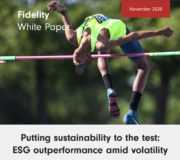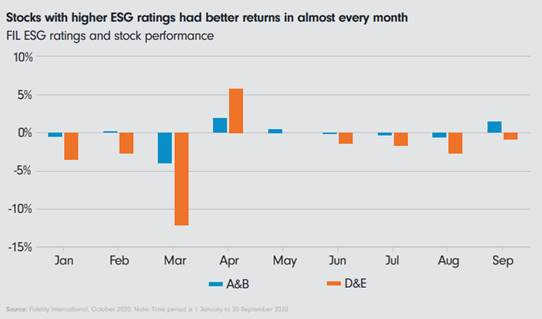
Bron
Fidelity
In the turbulent first nine months of 2020, a period heavily impacted by the Covid-19 pandemic, stocks with higher ESG ratings outperformed those with weaker ESG ratings in every month from January to September, apart from April, according to new research by Fidelity International The research timeframe covers both the market crash in March and the recovery April-onwards. It suggests a strong positive correlation between a company’s relative market performance and its ESG rating. Over the nine months, stocks with an ESG rating of ‘A’ outperformed the MSCI AC World Index, and what’s more, there was a clear linear relationship demonstrated across the ESG ratings groups, with each one beating its lower rated group from A down to E.
Jenn-Hui Tan, Global Head of Stewardship and Sustainable Investing at Fidelity International comments: “We’re pleased to observe the relationship between high ESG ratings and returns over the course of a market collapse and recovery. This supports our view that companies with good characteristics have more prudent management and will demonstrate greater resilience in a crisis.
“The market volatility of 2020 echoes that of 2008, despite the difference in circumstances. It would be natural to shorten investing horizons in a time of uncertainty and put longer-term concerns about environmental sustainability, stakeholder welfare and corporate governance on the back burner.
“But our research suggests that the market does, in fact, discriminate between companies based on their attention to sustainability matters, both in crashes and recoveries, demonstrating why sustainability should be at the heart of active portfolio management.”
Fidelity International carried out the performance comparison across 2,659 companies covered by its equity analysts, and 1,450 companies in fixed income, using the company’s proprietary ESG rating system. The forward-looking ratings are derived from direct engagement with companies, aggregating approximately 15,000 individual company meetings per year.
Fixed Income
The findings in fixed income are similar to those in equity. The bonds of the 154 A-rated companies returned around -0.5 per cent on average, compared with -1.5 per cent for the 557 B-rated companies and -4.6 per cent for the 225 D-rated companies.
High quality factor
In the study, one exception to the rule came in April. For the rest of the months, the better ESG-rated stocks (A and B), had higher returns than poorly rated stocks. But in April, the groups with higher ESG ratings fell less as the markets collapsed and rose less when they recovered sharply compared with those with lower ratings. This suggests that those stocks with higher ESG ratings also have a low beta high quality factor and are less prone to volatility in the broader market.
Previous study
Fidelity International conducted an earlier iteration of this study in April 2020, focusing on the 36 days between 19 Feb and 26 March where the S&P 500 fell 26.9 per cent. The initial study tested the effect of the market volatility on companies with different ESG characteristics and yielded the same conclusion: companies with high sustainability ratings outperformed their peers.
It’s encouraging to see that the conclusion then, over a relatively short time frame, remains consistent with the conclusion today, lending weight to the argument that sustainability factors can be indicative of a company’s market performance at different points in the market cycle.




